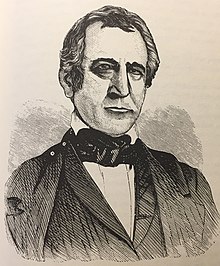Elon Galusha (June 18, 1790 – January 6, 1856) was a lawyer and Baptist preacher who was active in reform activities of the early 19th century in New York. He was the son of Jonas Galusha, the 6th and 8th governor of Vermont. He also adopted and promoted the teachings of William Miller.

Biography
editGalusha was born June 18, 1790, in Shaftsbury, Vermont.[1] His father was Jonas Galusha, the governor of Vermont. Galusha received the honorary degree of M. A. from the University of Vermont in 1816, and an honorary M. A. from Brown University in 1820.[1]
Galusha died January 6, 1856, in Lockport, New York.[2]
Abolitionist activities
editGalusha took a firm stance against slavery. In 1836 he, along with other men of New York, including Obadiah N. Bush of Rochester, was named to represent New York at the third anniversary of the American Anti-Slavery Society meeting. He served as the first president of the Baptist Anti-Slavery Society.[4] He promoted the Liberty Party and preached about the evils of slavery.[5] Following his withdrawal from the Baptist denomination, he hosted abolitionist meetings at his church in Lockport.[6]
Millerite connection
editGalusha leaned toward a premillennial understanding of Bible prophecy. After personal deliberation, and having read William Miller's Lectures, Galusha joined the Millerite movement wholeheartedly under the influence of a fellow preacher, Nathaniel N. Whiting.[7]
Galusha served as president of the Albany Conference on April 29, 1845, following the Great Disappointment.[8]
References
edit- ^ a b William B. Sprague, Annals of the American Pulpit, or, Commemorative notices of distinguished American clergymen of various denominations : from the early settlement of the country to the close of the year eighteen hundred and fifty-five : with historical introductions, vol. 6 (Baptist) (New York : R. Carter and Brothers, 1860), p. 669
- ^ William Cathcart, The Baptist Encyclopedia, vol. 1 (Paris, AK: The Baptist Standard Bearer, Inc., 2001), p. 432
- ^ The Anti-Slavery Society Convention, 1840, Benjamin Robert Haydon, 1841, National Portrait Gallery, London, NPG599, Given by British and Foreign Anti-Slavery Society in 1880
- ^ Grosvenor, Cyrus Pitt, Richard Fuller, and Elon Galusha. Baptist Anti-Slavery Correspondent. Worcester, Mass: Executive Committee of the American Baptist Anti-Slavery Convention, 1841. p. 2
- ^ Douglas M. Strong, Perfectionist Politics: Abolitionism and the Religious Tensions of American Democracy, (Syracuse, NY: Syracuse University Press, 2001), p. 111
- ^ Douglas M. Strong, Perfectionist Politics: Abolitionism and the Religious Tensions of American Democracy, (Syracuse, NY: Syracuse University Press, 2001), p. 113
- ^ Elon Galusha, Address, of Elder Elon Galusha, with Reasons for Believing Christ’s Second Coming, at Hand (Rochester: Erastus Shepard, 1844) p. 4
- ^ Isaac Wellcome, History of the Second Advent Message and Mission, Doctrine and People, (Yarmouth, ME:I. C. Wellcome, 1874), p. 415
External links
editGrosvenor, Cyrus Pitt, Richard Fuller, and Elon Galusha. Baptist Anti-Slavery Correspondent. Worcester, Mass: Executive Committee of the American Baptist Anti-Slavery Convention, 1841. [1]
Elon Galusha, Address, of Elder Elon Galusha, with Reasons for Believing Christ’s Second Coming, at Hand. Rochester: Erastus Shepard, 1844. [2]